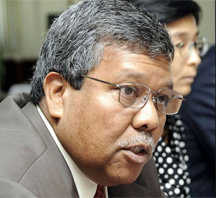PAHO Caribbean Programme Coordinator, Dr Ernest Pate, says that CARICOM must be more data driven in the prevention and treatment of chronic non-communicable diseases (NCDs).
He is also calling on CARICOM Heads of Government to “move” their commitment from principle to practice, noting that adequate resources were an imperative to fighting NCDs, said a press release from the CARICOM Secretariat at Turkeyen.
Dr Pate was delivering the feature address at the 2nd Annual Conference of NCDs Focal Points and Chief Medical Officers in Port-of-Spain, Trinidad and Tobago on Sunday.

The conference was organised by CARICOM in collaboration with the Pan-American Health Organization (PAHO), the University of the West Indies (UWI) and the Inter-American Development Bank (IDB).
This meeting was convened to discuss the implications for the Caribbean of the outcome of the United Nations High Level Meeting on the Prevention and Control of NCDs held in New York on September 19-20.
The meeting was also expected to examine the progress and challenges in key components of the Port-of-Spain Declaration, and outline priority actions and relevant support necessary to implement those actions.
Dr Pate singled out two major challenges – financial resources and insufficient data – which he stated were sticking points in government’s efforts to combat the diseases. Many countries, he noted, did not have accurate mortality and surveillance data on NCDS and consequently, could not do proper planning.
To date, lifestyle related diseases such as heart diseases, respiratory illnesses, cancer, diabetes, and risk factors such as obesity and high blood pressure are the leading causes of death in the Caribbean and account for 60-70% of deaths globally, the release noted.
There is a perception that NCDs are more concentrated in higher income countries, but Dr Pate argued that the data did not support that perception. On the contrary, the data pointed to an increase in the incidence of NCDs in middle and low income countries.
Burden
This, he said, required a review of the economic costs of this burden to include “out-of-pocket costs” which were not borne or measured by governments. Those costs, Dr Pate warned, were so exorbitant that they could drive citizens and countries to poverty.
However, the PAHO Caribbean Programme Coordinator acknowledged that the Caribbean had made significant in-roads in fighting NCDs but argued that much more interventions needed to be made at the point of prevention.
For this to happen, he added, Caribbean governments must make tangible commitments to support the prevention and treatment programmes, including primary health care services, which he stated needed re-vamping.
“If those resources are not in place then we are unable to tackle the epidemic. Our plans need to be supported by financial sources,” Dr Pate is quoted as saying.
He added that government financing for NCD initiatives must be “topped-up” by the private sector and International Development Partner (IDP) resources.
In addition, Dr Pate firmly believed that there was a need for a comprehensive approach to tackling NCDs; and noted that successes were reported in countries such as Finland where a comprehensive approach had been adopted.
Dr Pate also expressed the view that the Community’s priorities must of necessity include translating policies into action, increasing funding to keep pace with the epidemic; increasing advocacy and awareness especially among policy makers; adopting a comprehensive and multi-sectoral approach; strengthening surveillance and monitoring, thus providing evidence for policymakers and highlighting the impact of NCDs on development.
Dr. Rudolph Cummings, CARICOM Secretariat’s Programme Manager, Health Sector Development, who chaired the opening session, reminded participants of the reputed Port-of-Spain Declaration and pointed to the pivotal role played by the Community in planting NCDs on the global agenda. He underscored the Community’s contribution to the United Nations High Level Meeting (UNHLM) in September, not only in lobbying for the event, but also in drafting the Political Declaration which was the major outcome of the UNHLM.
Dr Cummings also urged participants to devise creative ways of sustaining the gains already made in NCDs. He applauded PAHO for supporting the Caribbean’s efforts and acknowledged the support of UWI and IDB for the meeting.
Meanwhile, Professor Samuel Ramsewak, Dean of the Faculty of Medical Sciences, UWI, St Augustine, in his opening remarks expressed concerns for the high rate of childhood obesity in the Caribbean, noting that it had tripled in the last 10 years and he stressed the need for this to be contained. He acknowledged the work of his institution in initiating the surveillance project and expressed pride in the sustained and steady course of what he called the “ship that is NCD Prevention and Control.” In his estimation, the size of the region was immaterial; it was the size of the influence that the region wielded that was important.
The three-day conference was attended by 30 CMOs and Focal Points, an unprecedented representation from PAHO Washington, New York, Barbados and Trinidad and Tobago, other private sector stakeholders and NGOs including CARICOM’s unswerving partner – Healthy Caribbean Coalition, the release concluded.





